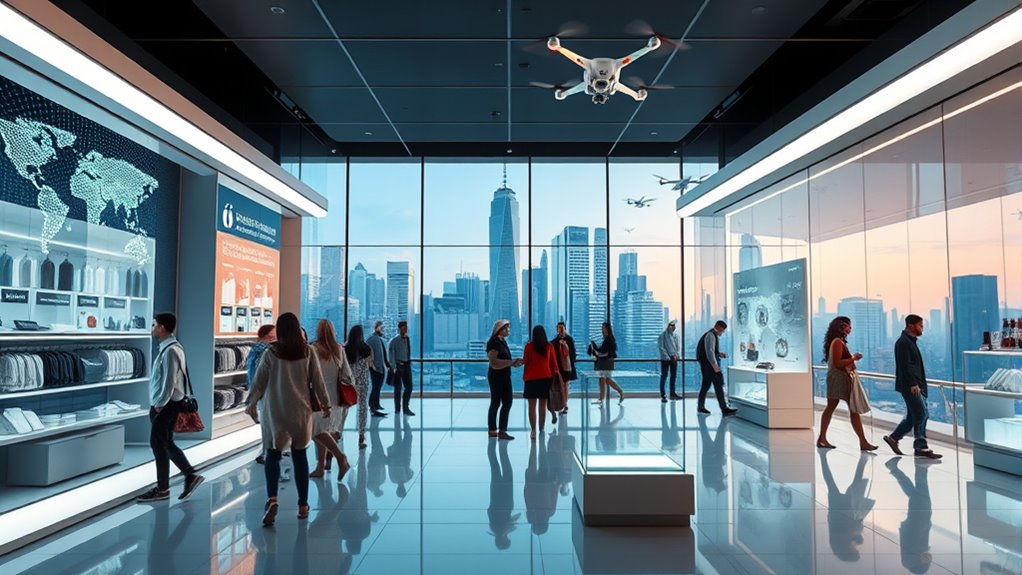AI is transforming globalization by enabling you to reach customers worldwide without traditional barriers. It personalizes recommendations, streamlines supply chains, and enhances digital payment security, making cross-border shopping easier and more efficient. AI tools reduce operational costs, predict consumer preferences in real time, and help small businesses access international markets. This borderless retail landscape is reshaping how you connect with global consumers, opening new opportunities. Keep exploring to discover how these changes continue to impact your world.
Key Takeaways
- AI enables personalized global marketing and recommendations, expanding consumer reach beyond borders.
- Borderless retail powered by AI reduces reliance on physical infrastructure, facilitating international market entry.
- Real-time data analytics optimize supply chains and logistics for seamless cross-border operations.
- AI enhances digital payment security and automation, encouraging international transactions and trust.
- AI-driven innovation lowers barriers for new entrants, fostering increased global competition and interconnected markets.

Artificial intelligence is transforming globalization in profound ways, reshaping economies, trade, and labor markets worldwide. One of the most visible impacts is in retail, where AI-driven technologies are breaking down traditional borders. Retailers now use AI-powered tools to personalize recommendations, optimize supply chains, and target customers across the globe with unprecedented precision. For example, platforms like Netflix demonstrate how AI can influence consumer behavior on a massive scale, with personalized content recommendations generating over a billion dollars in value. This borderless approach to retail means businesses can reach international markets more easily than ever before, regardless of physical location or local infrastructure.
By leveraging big data and advanced analytics, companies enhance customer experiences and streamline operations. AI helps them predict consumer preferences, optimize inventory levels, and tailor marketing strategies for specific regions—all in real-time. This reduces the need for physical stores or regional offices, enabling brands to operate seamlessly across borders. Automation tools powered by AI further diminish physical and logistical barriers, making cross-border e-commerce more efficient and cost-effective. As a result, consumers benefit from a wider array of products, competitive pricing, and faster delivery times, fostering greater global interconnectedness.
AI also transforms supply chain management by enabling smarter logistics and inventory management. Real-time tracking and predictive analytics reduce delays and costs, allowing companies to serve international markets more effectively. These innovations foster a more integrated global marketplace, where barriers like tariffs and customs delays are mitigated through smarter, AI-enabled logistics. Consequently, small and medium-sized enterprises gain access to international customers without the need for extensive physical infrastructure.
Furthermore, AI-driven automation accelerates the growth of digital payment systems and secure online transactions, making cross-border shopping safer and more accessible. Enhanced data security, fraud detection, and seamless payment options foster trust and convenience, encouraging consumers worldwide to buy from international vendors. As AI continues to evolve, its role in borderless commerce will expand, lowering entry barriers for new players and encouraging global competition. Effective relaxation techniques can also play a role in managing stress for consumers navigating this increasingly complex retail landscape.
While these advancements promote globalization, they also introduce new challenges. Geopolitical tensions and regulatory disparities can complicate AI integration across borders. Nonetheless, AI’s ability to redefine retail by making it more borderless, personalized, and efficient signals a seismic shift in how global markets operate. As you engage with these changes, you’ll find that AI isn’t just transforming retail—it’s reshaping the entire fabric of globalization, making it more interconnected and dynamic than ever before.
Frequently Asked Questions
How Does AI Impact Local Small Businesses in Global Markets?
AI impacts your small business in global markets by boosting your competitiveness and operational efficiency. You can target international customers more precisely, personalize marketing, and automate tasks to save time and money. AI also provides insights into global trends, helping you adapt quickly. Despite challenges like budget and knowledge gaps, adopting AI levels the playing field, allowing you to expand your reach, grow faster, and stay competitive on international stages.
What Ethical Concerns Arise From Ai-Driven Borderless Retail Expansion?
You should be aware that AI-driven borderless retail raises ethical concerns like data privacy violations, as AI can identify individuals from limited data. Biases in AI may lead to unfair treatment of diverse groups, and lack of transparency can erode trust. Additionally, there’s a risk of perpetuating stereotypes, creating misleading content, and fostering deceptive practices. Ensuring responsible AI use requires transparency, accountability, and adherence to ethical standards to protect consumer rights globally.
How Does AI Address Language and Cultural Barriers in Global Commerce?
You might wonder how AI overcomes language and cultural barriers in global commerce. It does this by providing real-time translation and localization, making your content resonate locally. AI recognizes cultural nuances, idioms, and norms, avoiding misunderstandings. It adapts marketing messages and legal documents to fit regional contexts, ensuring trust and compliance. This seamless communication breaks down barriers, opening new markets and boosting your international success effortlessly.
What Are the Privacy Implications of AI in International Customer Data Collection?
You should be aware that AI’s international customer data collection raises significant privacy concerns. Shadow AI tools can gather sensitive data without your knowledge, risking breaches and violations of privacy laws like GDPR and CCPA. This uncontrolled data flow can lead to unauthorized use, exposure of personal info, and loss of consumer trust. You need robust oversight and transparency to safeguard customer privacy and ensure compliance across borders.
How Can AI Prevent Market Monopolies Caused by Borderless Retail?
You can prevent market monopolies by enforcing strict antitrust laws and promoting interoperability among AI platforms. It’s essential to regulate dominant players like Google and Amazon, ensuring they don’t abuse their power. Supporting public options and cooperative models helps distribute control and access, while structural separation of infrastructure prevents data and market lock-ins. Early regulation, transparency, and fostering competition through diverse suppliers also protect against monopolistic dominance in borderless retail.
Conclusion
As you explore how AI is reshaping globalization, think of it as a bridge that connects distant shores, making the world feel smaller and more connected. With AI breaking down borders, you’re now part of a global marketplace where borders are just lines on a map, not barriers to opportunity. Embrace this new era where borders blur, and your potential expands infinitely — like a river flowing freely toward endless possibilities.









